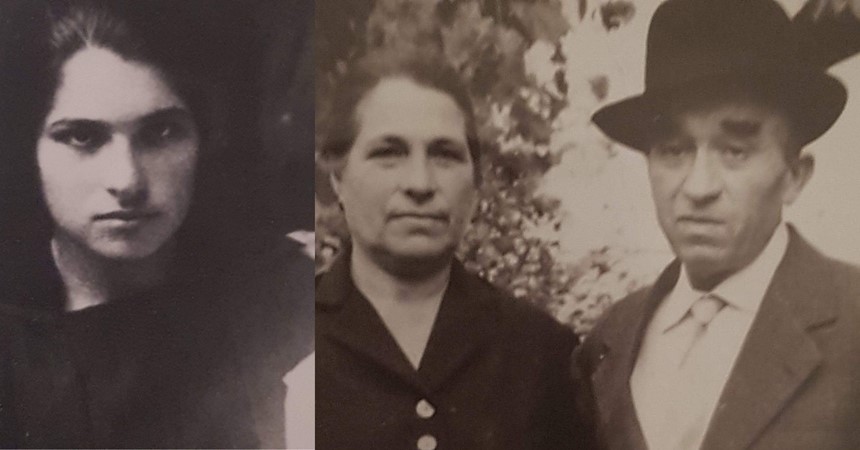The words contained in the creative non-fiction were so powerful that it was recently selected by the NSW Education Standards Authority (NESA) to appear in this year’s Young Writers Showcase.
Angeli is one of only 18 students selected to have their major work published in the 2021 edition of the Young Writers anthology, which celebrates the impressive talents of HSC English Extension 2 students from across the State. Reflecting on the inclusion of The Unfettered Soul, Angeli said she hoped it will serve as a meditation on life’s dichotomies – light and dark, hope and despair, love and loss.
Below is an excerpt from The Unfettered Soul. You can access the full version by purchasing a copy of the Young Writers Showcase at www.shop.nesa.nsw.edu.au/young-writers-showcase.
1924
Esterina sits on the edge of the bed she shares with her sisters. The needle pierces the ivory pillowcase, the white thread marries with creaseless linen, intertwining inexplicably with the sacred cloth. She intricately crafts her initials, each swirl a symbol of her becoming, her imminent womanhood. Where her husband will lay his head.
A pain throbs in her own, but she focuses on the rise and fall of her hand. She will be eighteen next month and must complete the final piece for her trousseau.
The ache in her head spreads to her hands. She relinquishes the embroidery, the slats of wood creaking as she shifts her weight to the middle of the bed.
Maybe if I close my eyes for a minute...
The shapes in her room dissolve. She dreams in white. White bed linen. White like the Virgin Madonna. White wedding dress, white satin shoes. White flowers lining the church aisle as she floats past, arm in arm with papa. A dozen people sit in the pews. When she reaches the altar, she turns around.
The faces of mamma, and her brothers and sisters. Lino sitting in the front row.
Lino.
A knock at the door awakens her. Esterina’s mother leans against the doorframe, her brow creased.
“Esterina, are you not feeling well?” Her mother asks, concerned by her daughter’s pallid complexion.
“Just a little headache, mamma.”
She takes her daughter’s hands in her own. Softened skin against calloused palms. “Lie down now, you can finish your needlework after dinner,”
Esterina pulls at a loose thread on her thin, fraying duvet. Something else to fix.
Lino.
Two years since he left, since they last spoke. Two years with no letters. He must be too busy to write, making money to bring home, she tells herself. And paper and pens and ink are expensive. And mail can so easily become lost.
She retrieves her needlework, the undulations of her hand more ferocious than before. Flares of inspiration as she translates her pain into motifs and monograms, which flourish like those dislocating waves.
She holds it up to the window, admiring it under the moonlight’s milky patina.
White snowflakes of peeling paint flutter from the ceiling. White vessels glide in the harbour with older brothers aboard.
1926
Light pours through the dance hall’s sheer, moth-eaten curtains, quivering in the evening breeze. Bodies move in time with the accordion's spirited melody, Esterina and Guido moving as one. Together they perform the Furlana, vibrant shapes and flamboyant motions combined.
The music slows, coming to an end.
“Shall we get some fresh air?” he asks.
They leave the hall and enter the night’s intoxicating spell. Esterina lays her head on Guido’s shoulder. They watch the stars dancing beneath the moon’s cratered face. The Aries constellation threaded across the sky. Bright, white fire.
The thread begins to unravel from the skein, revealing the future’s fragile design.
Guido will ask for her hand, and she will move to Zoppola. Away from mamma, papa, her brothers and sisters. The idea is thrilling but bittersweet. Salt rubbed in raw, unhealed wounds. This is the moment she had prepared for, with every twirl of the needle. Mysteries mamma had described to her as she stirred the polenta.
Guido brings her hand to his lips.
The mute swans sleep, drifting along on the river’s surface. Luminous tufts of floating white, blissfully unaware of the darkness that surrounds them.
Another thing mamma cannot explain – Where is Lino?
1928
Starched white cotton, stiff against her skin, Esterina stands before the marble altar at the church in Fossalta. Prayers and promises and blessings. Guido slips the gold band on her finger. Her youth fades into the summer air. She is a woman.
Forty-seven orbits of the sun. Underneath the covers of the bed my sister and I are sharing, I anticipate a night of disturbed sleep as jetlag mingles with the surreal feeling of being here. Until now, this place had just been a word. Castions. Now it has details – familial faces, fragrant flowers, rivers, and rhythms. Plump pillows cradle my contended weariness. I rest my hand beside my cheek, becoming acutely aware of the blossoming letters and borders. MBE.
Moni Bidin, Esterina. A black and white portrait in the hallway of my nonno Sante’s house, a vivid mosaic I have pieced together from the stories he has told me. This strong woman I had painted in my mind is beneath my fingertips, captured in the fibres of delicate silk. In this moment of tactile empathy, my hands are one
with hers.
We sit on the shoreline of these intergenerational verses, I take a stone from the broken terrain, skim it across the surface, and observe as the water ripples beneath its weight. I taste the salted air on my tongue, hear the reveries of breaking waves, feel the soft undulations of ancestral voices against my ankles. I envisage my heroine, her existence illuminated in the coins of light that scatter the sea’s surface. But to glorify this ocean and the space between would deny it of its power to shift and saturate and shatter and sever.




























































































